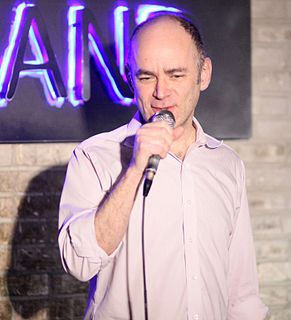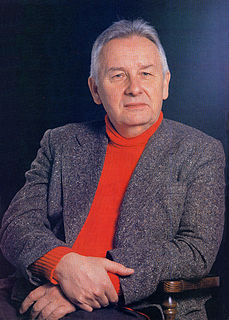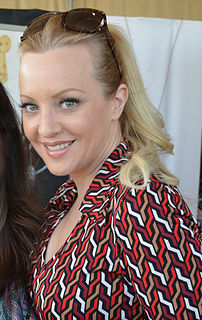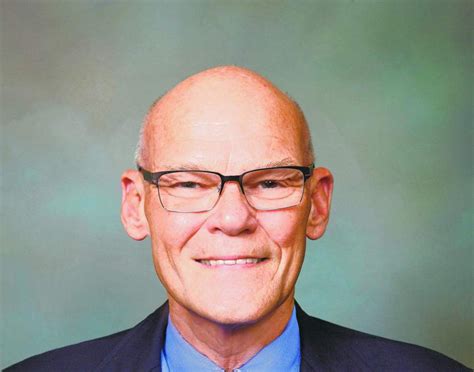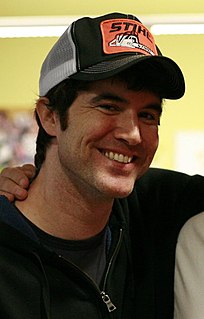A Quote by Salman Rushdie
When you're writing for the screen, you have to be hyper-conscious every moment of how the audience is going to react. If you write just one scene where the audience is confused or it breaks their concentration in some way, then you've lost them, and you might never get them back.
Related Quotes
I have a lot of friends who were stand-ups, and they just stopped after a while, because they didn't like that battle, or they just couldn't do it. And then they would get on a sitcom and get visible and get back into it, because the audience was just way easier on them. But they lost those crucial years of learning to turn any audience into your audience.
I've had shows where you think, "Is this going well? I can't tell," and then you say goodnight and you get this ovation. They're sorta like a theater audience. I've learned that much; that they're not always going to be doing backflips - but I'll never figure it out. Because sometimes you walk up there, and they're so excited, and then other times, it's just... But sometimes an audience is bad, and you can tell them they're bad, and that sort of breaks the ice a bit.
When I first started writing, there was no way I'd write a sex scene. That just seemed impossible. That's why in "Fight Club" all the sex happens off-screen. It's all just a noise on the other side of the wall or the ceiling. I just couldn't bring to write in a scene like that. So one of the challenges with "Choke" was I wanted to write sex scenes until I was really comfortable just writing them in a very mechanical way.
I do not choose my listeners. What I mean is, I never write for my listeners. I think about my audience, but I am not writing for them. I have something to tell them, but the audience must also put a certain effort into it. But I never wrote for an audience and never will write for one, because you have to give the listener something and he has to make an effort in order to understand certain things.
I never look at twists as a way to trick the audience. Obviously, I think a good story has surprises and unexpected turns, and you always want to do that with an audience. But it has nothing to do with conning them or making them believe so strongly in one thing and then kind of going the other way.
I learned how to let other performers have their moment. A lot of people can't do that. They just chew the scenery and steamroll over their scene partners. It doesn't make you look better in the long run to do that. You have to have balance in your scene. If it's somebody else's moment, let them have it. Learn how to be generous. Plus, it makes the audience hate you.
Put in every joke that's not a dud and then let's just start pulling the ones that work the least. You're just constantly sifting until you're left with the biggest chunks of gold. The audience also tells you what some of those chunks are. You can have your own favorites, and then, once you screen it for an audience, the audience tells you what they're entertained by. I feel like that's a big part of it.
I love dipping into worlds at a fast and furious pace. A little glimpse allows the audience to put together the rest of that world in their brain. I love sketches that require the audience to piece together the comedic engine themselves. Give them all the information but not tell them what the scene is about so they can have that eureka moment of, "Oh my God, he's only used to the way urban students pronounce their names. That's what's going on here.".
I'm grateful that I had that uphill battle for 10 years of going onstage and having nobody know who I was, because you have to win them over. I have a lot of friends who were stand-ups, and they just stopped after a while, because they didn't like that battle. And then they would get on a sitcom and get visible and get back into it, because the audience was just way easier on them. That's why they're okay stand-ups, but they're never going to be great, because they don't have that presence. They never built those muscles up.
Don't let a single comic moment pass you by; then help the audience get the laughs. Give them permission to laugh by holding for laughter and by letting them know early on what they're in for. In the first few moments, the audience is gathering information, looking at the scenery and costumes. Create a comic moment as soon as you can.
I think all great comedies - or at least the comedies I like - it has some of the funniest moments, but it never breaks the spell for the audience. It never pushes the audience away by spoofing itself too much or undermining the characters or making them cardboard or flimsy. Everybody is really trying to do what their characters believe in - and so nobody breaks the spell of the world, even though in other ways it's a comedy and very funny.
You're in a movie, so you have to think about how something plays. It's not like you're thinking about how an audience is going to react. You're trying to present the story. You're trying to illuminate the lives of these people in the story. So I'm thinking about how my behavior as this character best illuminates what's going on with them in this moment in time. I always say it's sort of the director's job. People think that the directors direct actors. No. Really, what the director's doing is directing the audience's eye through the film.


